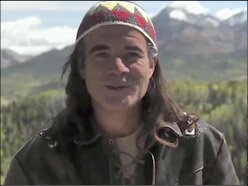September 2018

Arkan Lushwala
A number of us were gathered in the home of Bill and Lynne Twist to hear from a Peruvian shaman named Arkan Lushwala . The people seated in their living room were financial supporters of an organization co-founded by the Twists, The Pachamama Alliance. I met Lushwala several years before at another Pachamama event and was quite impressed with his presence. This occasion was a new book he had just published – Deer and Thunder.
Lushwala is a rare indigenous bridge of the global north and south, carrying spiritual traditions from the Andes in his native Peru as well as being adopted and initiated by the Lakota people of New Mexico. Here’s a short video of Lushwala.
His talk was about the wisdom of indigenous ways of being with Nature and the need to stay conscious and aware of the impact one is having. After his talk, it was time for Q&A, and a young man seated in front of me asked what seems like a question any modern-day industrialized Westerner might ask – how do we stay awake? …with an emphasis on stay.
Without missing a beat, Lushwala responded. “The goal isn’t to stay awake,” he said, “but how to wake up after you realize that you’ve fallen back asleep.” He explained that humans do, on occasion, fall “asleep” – go unconscious or what some people call going on automatic pilot; that is something we do. The challenge is to catch ourselves when this happens and wake back up, returning to a conscious state. His answer reminded me of the way some people view meditation, wanting all thought to be suspended when the point is to catch the thoughts, let them go and come back.
What struck me was the different cultural/generational perspectives. The industrialized mind wants to make perfect something that is seen as imperfect; the indigenous mind looks at how to work with what’s so, like working with Nature, the way it is, messy and not always looking “perfect” from the perspective of the modern day human.
It struck me that the young man’s question was coming from a somewhat adolescent perspective while the indigenous worldview that Lushwala demonstrated is more adult, more grown up and mature, with thousands of years’ experience behind it.